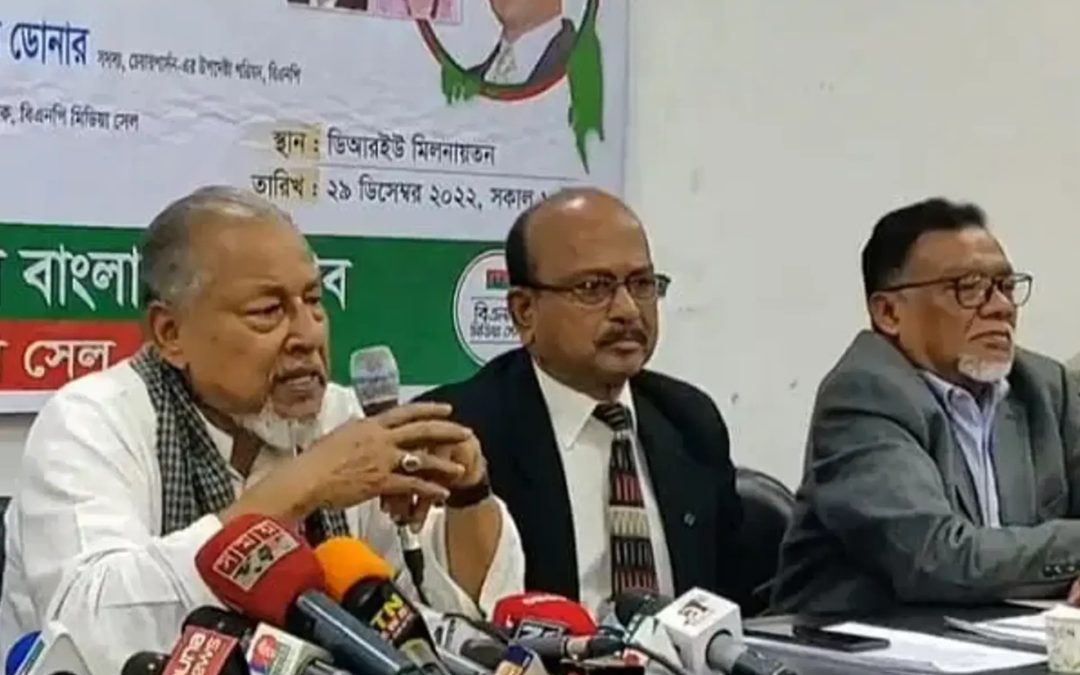Speaking at an event in Segunbagicha, the capital of Dhaka, Nazrul Islam Khan was speaking at the Nasrul Hamid Auditorium of Dhaka Reporters Unity (DRU)|Photo: Collected
A Nation at Crossroads
Bangladesh stands at a pivotal moment in its history, grappling with challenges that threaten its democratic fabric and institutional integrity.
For decades, the resilience of its people has shone through adversity, but recent political dysfunction has strained the nation’s core.
The echoes of dissatisfaction are growing louder, calling for reflection and reform.
As articulated by BNP Standing Committee member Nazrul Islam Khan, the current political and administrative structures demand urgent repair.
The question looms: can Bangladesh rise to reclaim its democratic promise, or will it remain mired in dysfunction?
The Decline of Democratic Institutions
Nazrul Islam Khan paints a grim picture of Bangladesh’s electoral and administrative systems.
He claims that the Election Commission, once a pillar of impartiality, has now become merely an extension of the ruling party’s will.
The politicization of administrative machinery has further eroded trust, rendering institutions ineffective.
Speaking at the Nasrul Hamid Auditorium in Dhaka, during an event organized by the Doctors Association of Bangladesh (DAB), Khan criticized the ruling Awami League for undermining foundational state structures.
He highlighted contradictions in governance, such as advocating secularism while upholding Islam as the state religion and promising press freedom while imposing restrictive laws like the Digital Security Act.
Khan emphasized that the state is not merely a collection of laws but an institution rooted in constitutional sanctity—a principle the government has allegedly disregarded.
The destruction of the electoral process, where opposition candidates face harassment and disenfranchisement, underscores the urgency for reform.
The Widening Gap: Inequality and Economic Injustice
Bangladesh’s economic landscape reveals a troubling dichotomy.
While a select few amass immense wealth—often through questionable means—the majority struggles to meet basic needs.
Nazrul Islam Khan lamented that during the COVID-19 pandemic, 3.5 million people fell back into poverty, yet the number of millionaires surged at an unprecedented rate.
This stark inequality, he argued, contradicts the ideals of the liberation war, which envisioned a society of equality and dignity for all.
The BNP has identified this growing disparity as a direct consequence of poor governance by an unelected regime.
The lack of accountability has allowed corruption to flourish, exacerbating inequality.
Khan insists that the liberation war’s promise of reduced discrimination and guaranteed basic rights for all remains unfulfilled under the current government.
A Vision for Reconstruction: The 27-Point Outline
In response to these challenges, the BNP has proposed a comprehensive 27-point outline aimed at repairing the state structure.
Vice Chairman A ZM Zahid Hossain described this framework as both timely and essential, promising a return to democratic principles through inclusive dialogue and collaboration with like-minded political entities.
The plan includes a critical review of Article 70 of the Constitution and other systemic reforms to ensure transparency and accountability.
Zaheer Uddin, convener of the BNP’s media cell, emphasized that the BNP has consistently identified structural weaknesses and is committed to addressing them.
Under the leadership of figures like Professor Haroon Al Rashid and others, the party aims to rebuild a modern, equitable Bangladesh.
The roadmap calls for institutional strengthening, electoral reform, and policies that prioritize public welfare over partisan gain.
Verdict: A Call to Action
Bangladesh is at a juncture where inaction is no longer an option.
The country’s democratic foundations, economic equality, and institutional integrity are under threat, demanding urgent and bold measures.
The BNP’s 27-point outline provides a blueprint for reconstruction, but real change requires collective will—across political divides and among the people of Bangladesh.
The road ahead is steep, but the spirit of the nation, forged in its liberation struggle, holds the potential to overcome.
Let this be a moment of awakening, where unity and purpose pave the way for a brighter, fairer future.
Bangladesh must rise not for the few but for all dignity and rights.

